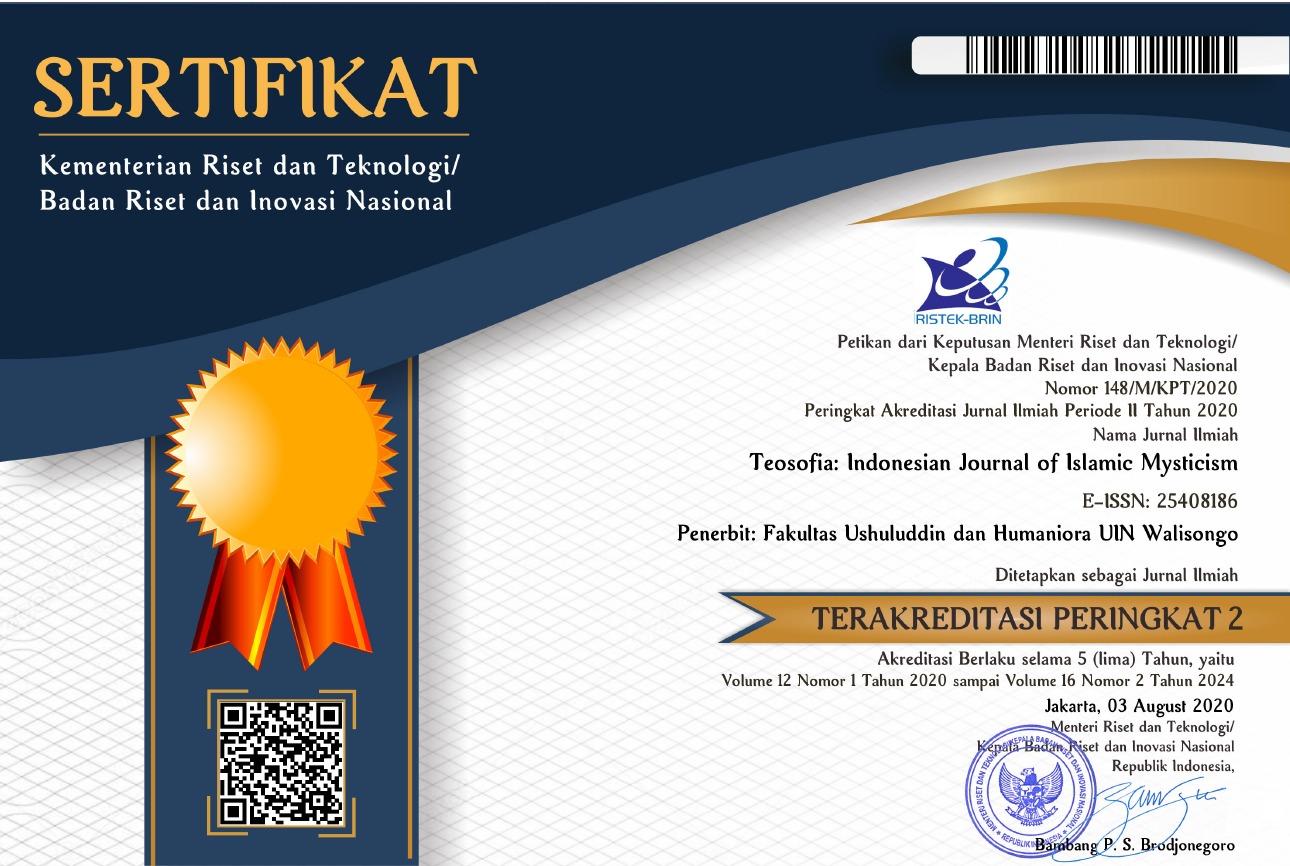Sufism and Pandemic: Lesson Learned from Sufi Teachings and its Prominent Figures
DOI:
https://doi.org/10.21580/tos.v10i2.10054Keywords:
intertextuality, overcome, pandemic, prominent figures, sufismAbstract
Religious perspective is an important aspect to be used in dealing with the COVID-19 global pandemic and the Islamic one is not an exception. It is Sufism that concerns more on the spiritual dimension of Islam that might be taken into consideration. Based on several books on Sufi scholars and teachings, such as al-Isfahani’s Ḥilyat al-Auliyā’ wa-ṭabaqāt al-Aṣfiyā, al-Attar’s Tadhkirat al-Auliyā, al-Sakandari’s al-Ḥikam, and others, this article proposes Sufi teachings as inevitable tools in facing the pandemic. Using content analysis, intertextuality, and historical approaches, this paper concludes how Sufism with its basic teachings such as ‘uzlah, ṣumtu, qanā’ah, shukr, et cetera, will be the suitable elements for Muslims to face and overcome the pandemic. Several prominent Sufi scholars will also be used to strengthen the argument.
Downloads
References
Ach Maimun. “Mahabbah Dalam Tasawuf Rabi ’ah Al-Adawiyah.” Millah 3, no. 2 (2004): 172–87. https://journal.uii.ac.id/Millah/article/view/7018.
Al-Attar, Faridudin. Tadzkirat Al-Auliya. Translated by Muhamad al-Asili al-Wasṭāni Al-Syafi’i. Tehran: Markaz Tahqiqat Kutub li-Ulum l-Islami, 2008.
Al-Ghazālī, Abu Hāmid. Minhāj Al-‘Abidīn Ilā Jannati Rabb Al-‘Alamīn. Cairo: Dār al-Minhāj, 1998.
Al-Isfahani, Abu Nu’aim. Hilyat Al-Auliya Wa-Tabaqat Al-Asfiya. Vol. II. Beirut: Dar al-Fikr li l-Tiba’a wa l-Nasyr wa l-Tawzi, 1996.
Al-Jampesi, Ihsan Muhammad Dahlan. Sirāj Al-Ṭālibīn. Beirut: Dar al-Fikr, 2002.
Al-Sakandari, Ibn Athaillah. Al-Hikam. Beirut: Dar al-Fikr li l-Tiba’a wa l-Nasyr, 1987.
———. Laṭā’if Al-Minan. Edited by Abd al-Halim Mahmūd. Beirut: Dār al-Mina, 2007.
Ali, Mohammed Farid. “Contentment ( Qanācah ) and Its Role in Curbing Social and Environmental Problems.” Islam and Civilisational Renewal 5, no. 3 (2014): 430–45. https://doi.org/10.12816/0009871.
Arifin, Samsul, and Akhmad Zaini. “Decision of Implementing Uzlah and Gerbat Techniques in Islamic Boarding School as Preparedness Response for Covid-19 Pandemic.” Unnes Journal of Public Health 9, no. 2 (2020). https://doi.org/10.15294/ujph.v9i2.38107.
Bisri, Hasan. “Religious Community Responses to COVID-19: Case Study on Muslim Small Community.” International Journal of Psychosocial Rehabilitation 24, no. 8 (2020): 10439–46. https://doi.org/10.37200/IJPR/V24I8/PR281038.
Braddock, Christopher. “Silence Will Change the World: Kierkegaard, Derrida and Islamic Sufism.” In The Philosophy of Spirituality, 189–208. Brill, 2019. https://doi.org/10.1163/9789004376311_012.
Daulay, Haidar Putra, Zaini Dahlan, and Chairul Azmi Lubis. “Takhalli, Tahalli Dan Tajalli.” Pandawa 3, no. 3 (2021): 348–65. https://doi.org/10.36088/pandawa.v3i3.1334.
Djalante, Riyanti, Jonatan Lassa, Davin Setiamarga, Aruminingsih Sudjatma, Mochamad Indrawan, Budi Haryanto, Choirul Mahfud, et al. “Review and Analysis of Current Responses to COVID-19 in Indonesia: Period of January to March 2020.” Progress in Disaster Science 6 (April 2020). https://doi.org/10.1016/j.pdisas.2020.100091.
Febriani, Dyah, Valeryan Bramasta, and Vanissa Noorizqa. “Evaluation of Government Policy Readiness in the Management of the Covid-19 Pandemy Viewed From the Implementation of Dynamic Governance.” Research Gate, no. April (2020).
Hidayaturrahman, Mohammad, Husamah Husamah, Sudarman Sudarman, Fitri Yanti, and Ita Rahmania Kusumawati. “Religious Behavior of Indonesian Muslims as Responses to the Covid-19 Pandemic.” Al-Adabiya: Jurnal Kebudayaan Dan Keagamaan 16, no. 1 (2021). https://doi.org/10.37680/adabiya.v16i1.704.
Ibad, Abdurrahman ibn. Al-Mafakhir Al-‘Aliyah Fi l-Ma’Atsir Al-Syadziliyah. Cairo: Maktabah al-Khanji, n.d.
Ilyas, Sabrida Muhammad. “Islamic Psychotherapy In The Pandemic Of Covid-19.” ENLIGHTEN (Jurnal Bimbingan Dan Konseling Islam) 3, no. 1 (2020). https://doi.org/10.32505/enlighten.v3i1.1581.
Irawan, Bambang, Ismail Fahmi Arrauf Nasution, and Hywel Coleman. “Applying Ibn ʿArabī’s Concept of Tajallī: A Sufi Approach to Environmental Ethics.” Teosofia: Indonesian Journal of Islamic Mysticism 10, no. 1 (2021). https://doi.org/10.21580/tos.v10i1.7204.
Karni, Awis. “Al-Tasawwuf Fî Indûnîsiyâ; Dirâsah Li Nuskhah Kitâb Matâlib Al-Sâlikîn Ta’lîf Yûsuf Al-Makâsârî.” Studia Islamika 3, no. 2 (1996). https://doi.org/10.15408/sdi.v3i2.810.
Kasdi, Abdurrohman, and Saifudin. “Resilience of Muslim Families in the Pandemic Era: Indonesian Millennial Muslim Community’s Response Against COVID-19.” Jurnal Penelitian 17, no. 1 (2020): 81–94. http://e-journal.iainpekalongan.ac.id/index.php/Penelitian/article/view/2781.
Klimová, Daniela, Jakub Styk, Simona Humplíková, Petra Priščáková, and Vanda Repiská. “COVID-19 Pandemy-The Global Challenge.” Lekarsky Obzor 69, no. 4 (2020): 102–6. https://www.lekarsky.herba.sk/index.php/2020/279-lekarsky-obzor-4-2020/867-pandemia-covid-19-celosvetova-vyzva.
Krippendorf, Klaus. Content Analysis: An Introduction to Its Methodology. 2nd ed. Thousand Oaks, CA: Sage, 2004.
Kristeva, Julia. Desire in Language: A Semiotic Approach to Literature and Art. Colombia: Columbia University Press, 1980.
Mukholik, Ayis. “Human Spirituality Phases in Sufism:The Study of Abu Nasr Al-Sarraj in The Book of Al-Luma’.” Teosofia: Indonesian Journal of Islamic Mysticism 6, no. 1 (June 15, 2017): 21–32. https://doi.org/10.21580/tos.v6i1.1699.
Mustakim, Muh., Kana Safrina Rouzi, and Tumin Tumin. “Spiritualization of Child Education in the Qur’anic Sufism Perspective in the Covid-19 Era.” International Journal of Islamic Educational Psychology 2, no. 1 (2021). https://doi.org/10.18196/ijiep.v2i1.11132.
Pabbajah, Mustaqim, Nurhidayat Muhammad Said, Faisal, M. Taufiq Hidayat Pabbajah, Hasse Jubba, and Juhansar. “Deauthorization of the Religious Leader Role in Countering Covid- 19: Perceptions and Responses of Muslim Societies on the Ulama’s Policies in Indonesia.” International Journal of Criminology and Sociology 9 (2020). https://doi.org/10.6000/1929-4409.2020.09.25.
Rajab, Khairunnas. “Maqam Dan Al-Ahwal Dalam Tasawuf.” Usuluddin 25 (2007): 5–6. https://ejournal.um.edu.my/index.php/JUD/article/view/5078.
Salleh, Kamarudin, Zaizul Ab Rahman, Ahmad Yunus Mohd Noor, and Mohd Izhar Ariff Izhar Mohd Kashim. “Resilience and Patience (Sabr) in Islamic View When Observing the Movement Control Order (MCO) during the Covid 19 Pandemic.” International Journal of Psychosocial Rehabilitation 24, no. 1 (2020): 5485–97. https://doi.org/10.37200/IJPR/V24I1/PR200654.
Sastra Yudha. “Tilik Respon Awal Pemuka Agama Terhadap Covid-19 Bersama STF.” http://rdk.fidkom.uinjkt.ac.id/, July 2, 2021. http://rdk.fidkom.uinjkt.ac.id/index.php/2021/07/02/tilik-respon-awal-pemuka-agama-terhadap-covid-19-bersama-stf/.
Thomas, Justin, and Mariapaola Barbato. “Positive Religious Coping and Mental Health among Christians and Muslims in Response to the Covid-19 Pandemic.” Religions 11, no. 10 (2020): 1–13. https://doi.org/10.3390/rel11100498.
Downloads
Published
How to Cite
Issue
Section
License
Copyright
The copyright of the received article shall be assigned to the journal as the publisher of the journal. The intended copyright includes the right to publish the article in various forms (including reprints). The journal maintains the publishing rights to the published articles. Therefore, the author must submit a statement of the Copyright Transfer Agreement.*)
Licensing

This work is licensed under a Creative Commons Attribution-ShareAlike 4.0 International License.
In line with the license, authors are allowed to share and adapt the material. In addition, the material must be given appropriate credit, provided with a link to the license, and indicated if changes were made. If authors remix, transform or build upon the material, authors must distribute their contributions under the same license as the original.
_______
*) Authors whose articles are accepted for publication will receive confirmation via email and send a Copyright Transfer Agreement.








